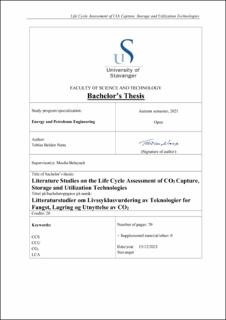| dc.description.abstract | In recent years, the awareness of climate change creates concern for the international
community. Human activities are the main factors that contribute to the natural greenhouse
effect of the earth. The burning of fossil fuels (Coal, Lignite, Natural gas) increases the emission
of carbon dioxide into the atmosphere.
The CO2 capture, and storage (CCS) technology is the best solution to mitigate the greenhouse
effect. There are several capture technologies that separate CO2 out of the fuel gas through
absorption, adsorption, or membrane gas separation methods. The capture technologies are
post-combustion, pre-combustion, and oxy-fuel capture. Among others, absorption, or carbon
scrubbing with amines is currently the dominant capture technology.
The life cycle environmental impact assessment case studies have shown that implementation
of carbon capture technology on the fuel driven power plant reduced the greenhouse gas by
about 90%. However, the non-greenhouse gas released due to amine degradation have shown
negative impacts on the environment such as Acidification potential (AP), Eutrophication
potential (EP), and Human toxicity potential (HTP). It is therefore important to perform life
cycle environmental impact assessment when implementing CCS and Carbon Capture
Utilization (CCU) technologies.
According to the Paris agreement signed by about 192 countries, the ambitious plan is to reduce
the CO2 emission by 50% in 2050 as compared to the level of 1990 (United Nations Treaty
Collection, 2016). For this,
- More research should be conducted to develop novel materials and technologies, which
have higher CO2 capture efficiency, reduced environmental impacts, lower energy
consumption and cost effectiveness as well.
- All nations should be responsible to fulfill their nationally determined contribution
commitments. | |
